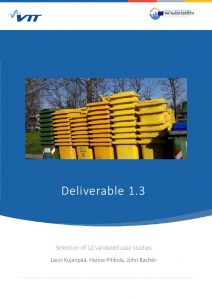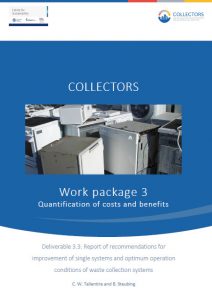The principles of MCDM
Methods of multicriteria decision-making (MCDM) can be used for breaking down complex problems into manageable components. With the help of MCDM, different dimensions that are important for the decision-making context may be considered and evaluated one at a time. With the help of group decision-making methods, opinions from several decision-makers (possibly having different values and preferences) can be collected and included in the decision. In general, the MCDM process consists of several steps that include:
- Definition of the overall objective (“Goal”) for the decision-making
- Dividing the goal to several lower level objectives that describe different dimensions relevant for reaching the goal
- Defining the criteria that describe the performance of the alternatives in each selected dimension
- Defining the decision alternatives and collecting data on their performance and characteristics
- Creating a matrix that describes the performance of the alternatives on each selected criteria
- The actual decision-making, consisting of criteria weightings by the participating decision-makers and ranking of the decision alternatives.
Use of multicriteria-decision making in COLLECTORS project
Decisions related to waste collection are examples of multicriteria decision-making situations, in which the decision-makers are typically confronted with concerns related to regulatory demands, costs, environmental issues, user preferences, technical issues and feasibility. With the help of multicriteria decision-making (MCDM), different dimensions, such as environmental and economic impacts that are important for waste collection, may be considered and evaluated one at a time. If MCDM is used for group decision-making, opinions from several decision-makers and related stakeholders can be collected and included in the decision.
Within COLLECTORS project, group decision-making methods were applied as participatory approaches. MCDM exercises were conducted in several workshops that were attended by European experts from waste management companies, waste agencies, municipalities and producer responsibility organisations, representing several European countries. A central aim of the MCDM workshops was to provide the participants with possibilities for discussion and knowledge exchange, and a chance to learn about the MCDM methods. In addition to decision-making methods, the project studied criteria that could be used to support decision-making and monitoring in the context of waste collection.
Recommendations related to use of MCDM methods
The experiences from the COLLECTORS workshops confirm that MCDM is useful for formulating priorities between the goals and actions in waste management. Besides, the findings from the study highlight, how MCDM methods could be useful for the problem definition and idea generation phases, and for collecting input and reaching consensus between different actors. The findings from the workshops indicate that both are important and challenging phases when considering the decision-making process as a whole.
One of the main challenges identified during the study related to lack of data. In the context of waste collection, decision-making seems to be often affected by lack of precise or comparable data. Filling in existing data gaps requires systematic efforts, implementing monitoring activities and cooperation (data exchange) between actors in the recycling value chain. This is necessary for improving all stages of the decision-making process in future.
Several MCDM methods were applied during the project. Use of Analytic hierarchy process (AHP) can be recommended for the problem definition and idea generation phases, when quantitative data about the performances of different options is still lacking. Use of AHP is most practical in situations when the amount of discussed options and applied criteria is limited. When choosing a waste collection strategy, or prioritising options in a situation when potential performance of the alternative options is known, several MCDM methods can be applied. In this project, applied methods included Multiattribute value-theory (MAVT) and PROMETHEE.
Based on the findings of the project, the following recommendations related to use of MCDM methods can be made:
- Multiple criteria (reflecting diversity of economic, environmental and social aspects) should be included in expert-driven decision-making in waste management.
- Problem definition and data gathering stages require the most time and effort, and are prerequisites for informed decision-making. These phases also create the majority of added value related to use of structured decision-making methods.
- Carrying out MCDM workshops at early stages in strategy selection reveals knowledge gaps and indicates priorities for further assessments.
Recommendations related to useful criteria to support decision-making
The evaluation criteria that were studied during the project were divided into six clusters that were identified as important for well performing waste collection systems.
Proposed clusters include:
- Capture and recycling rates
- Degree of separation and quality
- Convenience & coverage
- Engagement & participation
- Environment, health & safety
- Socio-economic impacts
Together, the clusters represent multiple objectives that constitute a well performing waste collection system. In order to make informed decisions related to waste collection, it is recommended that at least one criterion from each cluster should be included in decision-making at local or regional level. Efforts should be made in order to eventually increase the number of criteria that describe performance of the system within each cluster. The criteria presented here could be applied in local studies that apply methods of multicriteria decision-making, or for regular decision-making, management and monitoring activities.
The findings from the project indicate that proposed criteria differ in data availability. Some variation may take place due to differences in current monitoring practices, maturity of the collection system and how the collection has been organised. Some of the criteria are already part of existing monitoring systems, some require further adjustments or monitoring activities, while some are expected to gain more importance in future, due to changing recycling targets and emphasis in policies related to circular economy. Based on the experiences gained in this study, it is recommended that in all criteria clusters, both quantitative and qualitative information can be used. This makes it easier to include important social aspects in decision-making.
Findings from COLLECTORS project identified that good performance can be achieved with different kinds of collection strategies, but detailed knowledge about the existing system and its functioning is necessary, in order to find the best solutions for improving the situation. Thus, improving monitoring and reporting practices and increasing transparency are essential for improving performance. Public reporting makes also the benchmarking between systems easier.
In benchmarking, the criteria need to be comparable between regions that may have different amount of inhabitants, varying area sizes and large differences in generated amounts of waste, etc. The criteria presented in this report (and applied within the COLLECTORS database) aim to make at least partial comparison between different systems and collection strategies possible, even if the results have to be considered taking into account relevant regional characteristics, and uncertainties in applied background data.
Relevant publications
 D1.3 Selection of case studies
D1.3 Selection of case studies
This report describes the approach and MCDM methods used for identifying a group of potential cases of collection systems that could be studied during the project, taking into considerations contexts that prove to be challenging and performance indicators that allow the identification of well-performing cases.
Executive summary available here
D3.4 Report on the multiple criteria assessment of the studied waste collection systems and applicability of different methods for decision support
This report presents the main findings of four COLLECTORS workshops and multicriteria decision-making (MCDM) exercises; analyses challenges related to the studied decision-making situations; and provides recommendations about the use of MCDM methods in the context of waste management and collection.
Executive summary available here
 D4.4 Report on generalized criteria to support decision-making
D4.4 Report on generalized criteria to support decision-making
This report presents examples and recommendations about informative criteria that could be used for monitoring the performance of a waste collection system, comparing collection systems in different regions and evaluating the impacts of alternative collection strategies (or means of collection). Additionally, this report includes recommendations about criteria that could be used for identifying potential benchmarks among other systems, taking into account relevant regional characteristics.